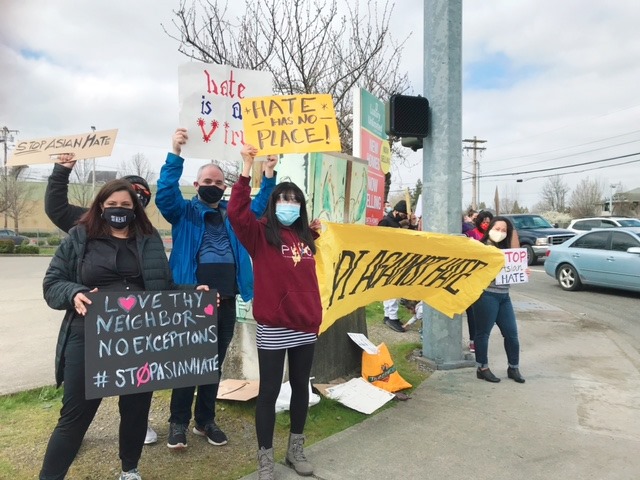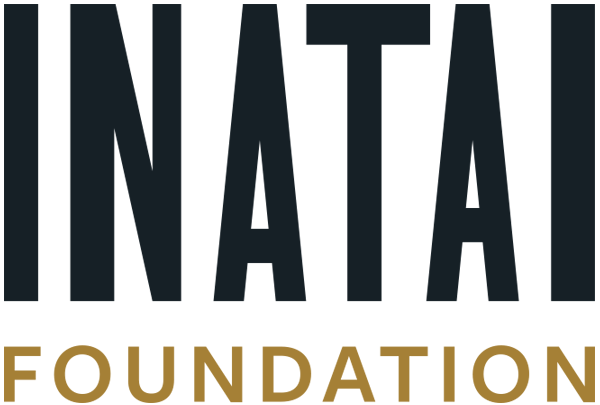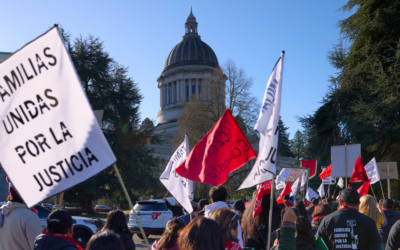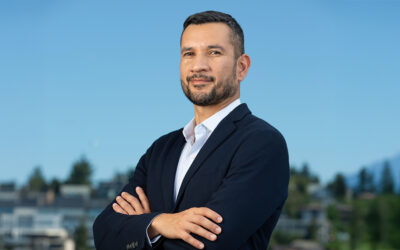Until Feb. 1, 2023, we were Group Health Foundation. This post was written under our former identity. To learn more about our new name, read our announcement here.

While anti-Asian racism is not new to our country’s history, the last few years were still difficult for many Asian people and communities who call Washington and the United States home. Pacific Islander and Asian leaders we spoke to commonly used the word “anxious” to describe the state of their communities. We learned about the vandalization of Asian-owned businesses and Asian community centers across the state from Spokane to Yakima to Seattle. Those working with Southeast Asian communities affected by American military intervention in Vietnam shared that the violence has triggered historical traumas among their elders.
To further support Asian-led and Pacific Islander-led work and in response to increasing anti-Asian violence, Group Health Foundation recently made grants totaling nearly $1 million to 35 organizations. The Equitable Response and Recovery Fund resources community-based organizations in times of crises to recognize their critical role in advancing equity and justice. The contributions were largely made to organizations the Foundation is already supporting through other funding. We also had the opportunity to connect with and learn from several groups who are new to our work.
We see these recent grants as one way to strengthen our support of Asian communities throughout the state—work for us that is ongoing and factored into all our grantmaking. This process has also taught us other ways we could be better philanthropic partners to both Asian-led and Pacific Islander-led organizations, including sharpening our analysis of anti-Asian racism by understanding the distinct and diverse experiences of each community.
To that end, many organizations are working to correct the narrative on the Asian experience in America. Asians are seen as the “model minority” or rendered invisible, and categorizing all Asians into one racial group perpetuates this harm. By lumping a vast number of ethnicities into one category, statistics favor more privileged groups and mask the experiences of Asians who are refugees, limited-English speakers, undocumented, and living with low incomes. Leaders emphasized that data disaggregation is key to telling more truthful stories about Asian experiences.
Similarly, we heard from both Pacific Islander and Asian leaders over the past year that it’s time to stop using the even less helpful racial category Asian Americans and Pacific Islanders—or AAPI. We incorporated this feedback into how we track our grantmaking, and when it came to this round of funding, we realized we have a lot more reflection to do as a staff.
We had discussions internally about the term AAPI and our team reckoned with two realities: that Pacific Islanders have historically been excluded in efforts claiming to serve AAPIs, and that we are currently responding to a crisis that began when a U.S. president called COVID-19 the “Chinese virus.” By using the too–broad term of AAPI, we would at once minimize the experiences of the very people who are the targets of anti-Asian violence and diminish the Indigenous identities of Pacific Islander people.
There is another reality we want to acknowledge: the history of cross-racial work between Pacific Islanders and Asians in Washington. Both have worked alongside each other’s communities to advance justice for their people, and to honor those relationships, we also granted dollars to Pacific Islander-led organizations.
We are thankful to have had this opportunity to learn from community leaders, both those working on our staff and those leading organizations we support. Our team recognizes that the journey ahead is not only learning what we do not know, but also unlearning what we think we know.
Please join us in supporting these 35 organizations who are working to organize political actions, preserve ancestral culture and language, strengthen community connections, provide rental assistance and mental health counseling, and advocate for immigrant justice. Many said they will specifically use the funds to expand the political education of Asian communities, including on topics like anti-Black racism, cross-racial solidarity, and intersectionality. Their efforts are wide-ranging and will add up to a future where Asian communities can stand stronger in their power.
List of Equitable Response and Recovery Grant Recipients
For the best viewing experience on your mobile device, please turn it sideways.
| Organization | Description | Service area |
|---|---|---|
| Aging in PACE Washington | Aging in PACE Washington uses a community-led model to provide culturally relevant wraparound services for low-income, nursing-home-eligible Asian elders in Seattle to age with dignity. | King County |
| API Chaya | API Chaya empowers survivors of gender-based violence and human trafficking to gain safety, connection, and wellness. The organization builds power by educating and mobilizing South Asian, Asian, Pacific Islander, and all immigrant communities to end exploitation, creating a world where all people can heal and thrive. | Seattle |
| Asia Pacific Cultural Center | Asian Pacific Cultural Center is a network-building organization that provides arts, language, and educational programs for Asian and Pacific Islander families representing over 45 cultural communities in Pierce County and across Washington State. | Pierce County, communities across Washington State |
| Asian Counseling and Referral Service | Asian Counseling and Referral Service works for social justice and offers a broad array of behavioral health programs, human services, and civic engagement activities for Asian Americans, Pacific Islanders, and other communities in King County and beyond. ACRS serves a wide range of Asian American and Pacific Islander communities – immigrants, refugees, and American-born – in the Pacific Northwest. | King County, Pacific Northwest |
| Asian Pacific Islander Americans for Civic Empowerment | Asian and Pacific Islanders for Civic Empowerment expands democracy by identifying and removing barriers that prevent AAPIs from full civic engagement. APACE creates pathways that educate and mobilize diverse communities to take action across Washington State. By activating AAPI voters, APACE has successfully moved the needle in key areas ensuring better representation for our communities and all communities as a whole. | Seattle/King County, WA |
| Asian Pacific Islander Coalition Spokane | APIC-Spokane was formed in the 1990s to advocate for the welfare of the Asian and Pacific Islander populations of the Spokane area. They are currently ensuring the population gets the right recovery resources so no one falls through the cracks because of immigration reasons or any others. They also work in solidarity with other communities of color. | Spokane |
| Chardi Kala Project | The Chardi Kala Project bridges Sikhs and non-Sikhs, fighting hate crimes against Sikhs (and others) through education. The Chardi Kala Project takes Sikh volunteers into schools and colleges to give presentations, set up booths at fairs, host field trips for classes and clubs to local Sikh Gurdwaras, produce Interfaith events, feed the hungry, and provide speakers. Most of the volunteers are Sikh youth. | Whatcom County |
| Chinatown International District Preservation and Development Assoc | SCIDPDA is a leading force for the economic health of Seattle’s Chinatown District, implementing strategies that range from support for individual businesses to marketing the entire neighborhood’s lively retail and cultural environment. SCIODPDA is an effective and informed advocate for neighborhood residents and businesses, promoting community improvements and public safety, and protecting the community from negative impacts. | Seattle |
| Chinese Information and Service Center | CISC is a nonprofit organization working to support immigrants and their families by creating opportunities for them to succeed, while honoring their heritage. A team of bilingual staff provides linguistically and culturally appropriate information, referral, advocacy, social, and support services to the Chinese immigrant community and immigrants from Eastern Europe, Latin America, and other parts of Asia. | King County |
| COFA Alliance National Network of WA | COFA Alliance National Network of Washington focuses on the well-being of residents of the Marshall Islands, Federated States of Micronesia, and Republic of Palau who are living in Washington under a Compact of Free Association (COFA). Long-term goals are for COFA citizens to live healthy, sustainable lives and provide leadership and representation in the state’s cultural and governmental institutions. | Statewide |
| Densho | Densho is a Seattle-based nonprofit with an online archive, education program, and public engagement centered on Japanese Americans from local and West Coast communities. Densho’s focus is on the states from which Japanese Americans were forcibly removed during WWII. Much of Densho’s content and roots originate in the Seattle area, where the majority of Densho’s staff, board, and community reside. Desnho tells a local and regional story with national significance. | King County, West Coast, Nationwide |
| Filipino American Community of the Yakima Valley | Established in 1938, the Filipino Community of the Yakima Valley’s rich history includes building the first-ever Filipino Community Hall in the United States from the ground up. Today, it is the hub of the Filipino American Community in Central Washington. It serves a rich diversity of people who honor their country of origin while contributing greatly to cultural, educational, social, economic, service, professional, spiritual, and civic life. | Yakima Valley |
| Filipino Community of Seattle Senior Services | Filipino Community of Seattle Senior Services works with the Filipino community throughout Washington State, focusing primarily on the needs of Filipinos in Seattle and King County. The Filipino Community Center is in the heart of the Rainier Valley – one of Seattle’s most ethnically diverse neighborhoods. Over 15,000 low- and moderate-income people live within one-mile of the location, resulting in many other immigrant and refugee groups, like Southeast Asians and East Africans, benefiting from the facilities and services. | King County |
| Filipino-American Association of the Inland Empire | FAAIE seeks to preserve and promote Filipino culture and heritage in the community. Formally established in June 12, 1987, FAAIE has been involved in countless social, humanitarian, civic and cultural activities and events for over 30 years. | Greater Spokane, Northern Idaho |
| Hmong Association of Washington | Hmong Association of Washington is a cultural, advocacy, and education organization serving 2,400 Hmong folks in Puget Sound and greater Washington State. | Puget Sound, Statewide |
| InterIm CDA | A nonprofit affordable housing and community development organization based in Seattle’s Chinatown/International District (CID). Since 1969 InterIm CDA provides multilingual, culturally competent housing and community building services to those disenfranchised due to lack of English, low acculturation, and poverty. Historically ICDA’s focus is on the API community living in the CID, although it also serves low-income limited APIs, refugee, and immigrant communities throughout Puget Sound. | Puget Sound |
| Japanese American Citizens League Seattle Chapter | The Seattle Chapter of JACL has been unafraid to tackle difficult and, often, controversial issues related to the wartime experience of the community and other civil rights issues. The exceptional pioneers, who sustained the organization during one the most difficult periods in U.S. history, laid a strong foundation for the work of future generations of Japanese Americans, who believe strongly in the principles of justice, equality, and fair play. | Seattle |
| Kandelia | Kandelia was born over 40 years ago as the Vietnamese Friendship Association. The goal was to support Vietnamese refugees moving to Seattle after the Vietnam War as people were seeking to provide opportunities for their families to survive and ultimately succeed. Due to the resilience, support, and success of the Vietnamese community, Kandelia evolved over the years to serve all immigrant and refugee communities looking for the same goals. | Seattle |
| Korean Community Service Center | KCSC’s mission is to be a bridge for Korean immigrants and the wider Asian community to fully integrate into society and overcome economic, health, and linguistic barriers so that they become independent and thriving members of the community. | Edmonds |
| Laotian American National Alliance | For more than 20 years, LANA has been a resource for Laotian Americans across the U.S. LANA has organized a get-out-the-count for the Census campaign and get-out-the-vote drives for more than 50,000 community members, advocated for policies that lessoned institutional barriers for Laotian Americans, and facilitated town halls and similar events on critical issues facing the community. | National |
| Neighborhood House Inc. | Neighborhood House provides services to address the needs of families, with a focus on low-income community members, public housing residents, immigrants and refugees. They serve over 15,000 people annually through early learning, youth education, family and social services, employment and adult education, health, and housing counseling. | Seattle |
| Organization of Chinese-Americans Inc | OCA is a national organization dedicated to advancing the social, political, and economic well-being of Asian Pacific Americans in the United States. Its original name was Organization of Chinese Americans; however, the name was changed to the acronym since their work and collaboration reaches other communities. The Greater Seattle Chapter was formed in 1995, and since that time, it has been serving the Greater Seattle Chinese and Asian Pacific American community as well as other communities in the Pacific Northwest. | Seattle, National |
| Pacific Islander Community Association | Pacific Islander Community Association (PICA) is a new organization committed to establishing deep and accountable networks of Pacific Islander communities across the region and ensuring social, political, and physical well-being for families. Priorities include civic engagement, strengthening anti-racist organizing, and providing advocacy for Pacific Islander communities across all sectors, issues, and areas. | Western Washington, Southwest Washington & Eastern Washington |
| PIVOT | PIVOT seeks to be the collective voice for progressive Vietnamese Americans, to engage and empower Vietnamese Americans through civic engagement and leadership development, and to support policies and candidates that are aligned with their values. PIVOT is pursuing these goals by promoting support for human, civil, immigrant, and refugee rights. PIVOT also promotes increasing cultural, linguistic, and financial access to quality education, health care, and economic opportunities for all immigrants. | National, King County |
| Refugee Women’s Alliance | Refugee Women’s Alliance (ReWA) is an award-winning, nationally recognized nonprofit that provides holistic services to help refugee and immigrant women and families thrive. | Seattle, South King County |
| Southeast Asia Resource Action Center | SEARAC is a civil rights organization that represents the largest refugee community ever resettled in America. It works to empower Cambodian, Laotian, and Vietnamese American communities to create a socially just and equitable society through policy advocacy, advocacy capacity building, community engagement, and mobilization. SEARAC has authored national legislation and passed California legislation calling for transparent, disaggregated data for the Asian American community. | National |
| Spokane Chinese Association | Spokane Chinese Association is a nonprofit organization that connects and unites people of Chinese heritage in the Greater Spokane area, with the purpose of fostering stronger community connections and pursuing a more enriched quality of life. | Spokane |
| Spokane Community Against Racism | SCAR works to amplify the voice of the community, provide strategy for advocacy efforts, serve as a watchdog for court and legal proceedings, act as a liaison for community groups, and provide community education. | Spokane |
| Tasveer | Tasveer’s mission is to inspire social change through thought-provoking South Asian films, art, and storytelling. Tasveer organizes events that use engagement with the arts to spark discussion, build coalitions, foster resilience, and inspire activism, amplifying the voices of underrepresented/ marginalized communities of South Asia. They envision an informed and just society where storytelling leads to truth-telling and in the process, individuals are entertained, transformed, healed, and empowered. | Greater Seattle area |
| United Territories Of Pacific Islanders Alliance | UTOPIA is a queer and trans people of color-led, grassroots organization born out of the struggles, challenges, strength, and resilience of the Queer and Trans Pacific Islander community in South King County. | South King County, Statewide |
| ViệtQ | ViệtQ is devoted to celebrating and empowering LGBTQ Vietnamese folks in the Pacific Northwest by raising visibility via awareness campaigns, events, and mentorship. | Statewide |
| Voices of Pacific Island Nations | Voices of Pacific Island Nations is a culturally-based organization providing high-quality, culturally responsive services and resources for Pacific Islander students and their families in order to close educational opportunity gaps in Kitsap County. | Kitsap County |
| Washington State Coalition Against Domestic Violence | WSCADV is a membership organization of 74 local domestic violence programs. They are part of the community fabric in all 39 counties of Washington. The majority of members are rural, and the rest are urban, Tribal, or serving both rural towns and small cities. WSCADV works especially closely with programs in Central Washington. | Yakima, Chelan, Douglas, Okanogan, Grant, Adams, Walla Walla, Forks and west Clallam County, and King County. |
| Wing Luke Memorial Foundation | The Wing Luke Museum serves as a cultural and economic anchor for Seattle’s Chinatown-International District (CID), home to Asian Pacific American immigrants and refugees for 100+ years, the city’s lowest-income district, with poor health outcomes, and identified by the city as high risk for displacement. | Seattle |
| Yakima Buddhist Church | The Yakima Buddhist Church and Kaikan, built in 1928, are headquarters for the Yakima Valley Japanese Community and the Yakima Japanese Bochi (cemetery association) where they host their annual meetings and graduation banquets. The annual Sukiyaki Dinner feeds around 1,600 people from the Yakima Valley and has become a major community event that many look forward to attending. | Yakima Valley |



